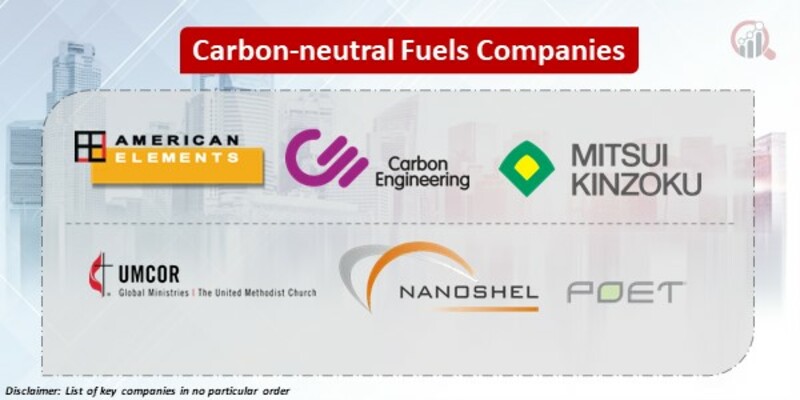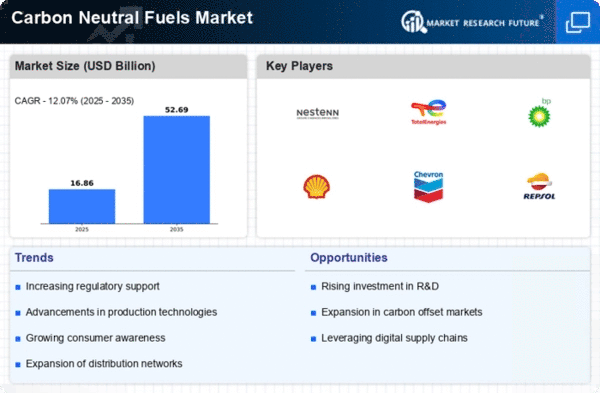Top Industry Leaders in the Carbon Neutral Fuels Market

The world is grappling with the urgency of climate change, and the transportation sector remains a major contributor to greenhouse gas emissions. As a result, the demand for carbon-neutral fuels is skyrocketing, creating a dynamic and exciting market landscape. This report delves into the competitive landscape of this burgeoning industry, exploring strategies adopted by key players, factors influencing market share, noteworthy industry news, and a comprehensive summary of the current state of affairs.
Competitive Landscape and Strategies:
The carbon-neutral fuels market is characterized by a diverse range of players, each vying for a slice of the pie. Here are some of the key players and their strategies:
-
Traditional oil and gas giants: Companies like Shell, ExxonMobil, and BP are investing heavily in renewable technologies like biofuels and hydrogen production to diversify their portfolios and remain relevant in the transition to a low-carbon economy. They leverage their existing infrastructure and marketing expertise to gain a competitive edge.
-
Renewable energy companies: Companies like Ørsted and Iberdrola are expanding their focus beyond wind and solar power to include green hydrogen production and sustainable aviation fuels. They emphasize their clean credentials and focus on building partnerships with airlines and other transportation sectors.
-
Start-ups and innovators: Numerous innovative start-ups are driving technological advancements in areas like carbon capture and utilization, synthetic fuels, and electric vehicle charging infrastructure. Their agility and focus on niche technologies allow them to disrupt existing players and capture new market segments.
Factors Influencing Market Share:
Several factors influence market share in the carbon-neutral fuels market:
-
Technology maturity and cost: Different carbon-neutral fuel options have varying levels of technological maturity and cost competitiveness. Biofuels are currently the most widely available, but their production is land-intensive and faces sustainability concerns. Hydrogen and synthetic fuels hold immense potential but require significant infrastructure investments and cost reductions to become commercially viable.
-
Government policies and incentives: Government support through carbon pricing schemes, tax breaks, and subsidies can significantly influence the adoption of different carbon-neutral fuel options. Countries with ambitious climate goals are actively investing in this space, creating lucrative opportunities for market players.
-
Consumer preferences and infrastructure: Consumer awareness about the environmental benefits of carbon-neutral fuels is growing, driving demand. However, the lack of readily available fueling infrastructure for alternative fuels like hydrogen and synthetic fuels remains a challenge.
Key Companies in the Carbon-neutral fuels Market includes
-
Carbon Engineering Ltd
-
Mitsui Kinzoku
-
Umcor
-
Nanoshell LLC
-
American Element
-
Pometon Powder
-
ADM
-
POET, LLC
Recent Developments:
August 2023: Tesla announces plans to build a large-scale lithium-ion battery factory in Germany, potentially paving the way for more affordable electric vehicles and reducing reliance on carbon-neutral fuels.
October 2023: The International Maritime Organization adopts new regulations to reduce greenhouse gas emissions from shipping, leading to increased demand for green ammonia and other carbon-neutral marine fuels.
November 2023: ExxonMobil announces a joint venture with Global Clean Energy to develop and commercialize sustainable aviation fuel from captured carbon dioxide and renewable energy.
December 2023: The European Commission proposes a new carbon border tax on imported goods, potentially incentivizing domestic production of carbon-neutral fuels.











